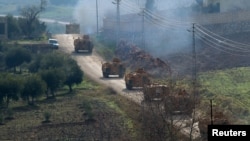Turkey has launched an air and ground campaign into Afrin, a Kurdish-controlled enclave in northwestern Syria. Codenamed "Operation Olive Branch," it's the latest chapter in a decades-long conflict between Turkey and Kurdish militants. Here's a look at why this is happening now and what's at stake:
What's the goal?
Turkish Prime Minister Binali Yildirim has said Turkey wants to create a 30-kilometer (20-mile) deep "secure zone" in Afrin. President Recep Tayyip Erdogan has said the military operation is essential for Turkey's security and Syria's territorial integrity.
The Turkish operation aims to oust from Afrin a militia made up of an estimated 8,000 to 10,000 fighters affiliated with the People's Protection Units or YPG, a Syrian Kurdish group that has controlled territory in northern Syria and proven effective in fighting the Islamic State group.
Turkey considers the YPG to be a terrorist organization and an extension of the outlawed Kurdistan Workers' Party or PKK, which has fought for Kurdish autonomy in Turkey.
The PKK has waged an insurgency in Turkey since 1984 that has claimed some 40,000 lives. A peace process collapsed in 2015 and the conflict resumed, with devastating street battles and major bomb attacks in cities.
The YPG and its political counterpart, the Democratic Union Party, or PYD, say they want regional autonomy within a federalized Syria. They control nearly 25 percent of Syrian territory dubbed Rojava that includes the three "cantons" of Afrin, Kobani and Jazira.
The PKK, YPG and PYD consider as their guide the Kurdish Marxist-nationalist leader Abdullah Ocalan, who is imprisoned on a Turkish island for leading a separatist movement.
While Turkey's Western allies, including the U.S., consider the PKK a terrorist group, Washington has offered direct military and logistical support for Syrian Kurdish militants, known as the Syrian Democratic Forces, to fight IS in Syria. This has infuriated Ankara and strained its relations with Washington even though the two are NATO allies.
The YPG denies accusations of separatism and the YPG-dominated Syrian Democratic Forces said Monday the Turkish offensive "gives IS a space to breathe."
Why now?
Turkey has long warned it would not allow a "terror corridor" on its border with Syria and launched a cross-border operation with Syrian opposition forces into Jarablus in northern Syria in 2016.
That operation cleared the Turkish border and nearly 2,000 square kilometers of the extremist IS but also aimed to prevent the YPG from linking the Afrin and Kobani cantons.
Turkey is pushing to be a key player in the Syrian conflict on behalf of rebels in peace talks in Kazakhstan, where it has been negotiating with Russia and Iran, who represent the Syrian government.
The parties have agreed on "de-escalation zones," which has allowed Turkey to send troops to rebel-held Idlib province in October as a monitor. But once again, Turkey's other goal has been to check the YPG's westward expansion, and Turkey amassed troops and armored vehicles between Idlib and Afrin.
The latest development leading up to the Afrin operation was an announcement by the U.S. military earlier this month that it was going to create a 30,000-member border force with the Kurdish fighters to secure northern Syria.
This has incensed Turkish leaders who claim that U.S. arms provided to the Syrian Kurds are and will be used against Turkey.
Secretary of State Rex Tillerson has tried to walk back the U.S. position, saying it was misrepresented. The U.S. also is discussing with Turkey and others the possibility of setting up a security zone on the Syria border to address Turkey's concerns about a Kurdish enclave there, Tillerson said Monday. The buffer zone Turkey has been pushing for since 2012 may be closer than ever, with one already established around Jarablus.
What's at stake?
The Afrin operation poses considerable military and political risks for Turkey. Erdogan has slammed critics who describe the operation as an "invasion" and said Turkish troops would leave after fulfilling their mission.
The Afrin district houses an estimated 800,000 civilians, including displaced people from earlier years of the Syrian war. Airstrikes could lead to another humanitarian crisis.
If Turkey's campaign proves successful, it could continue on to Manbij, where U.S.-backed Kurdish militants are in control since pushing IS out. Turkey has long accused the U.S. of going back on a promise that the militants would withdraw from the town.
The operation risks destabilizing a relatively peaceful area in Syria where civilians have found refuge and could further complicate the seven-year civil war.
The U.S. has urged Turkey to exercise restraint and said it would maintain a military presence with the Kurds for the foreseeable future. This continued support angers Turkish leaders, who expressed dismay that the U.S. chose to work with Syrian Kurds rather than Turkey in the fight against IS.
The European Union also warned Turkey that its offensive could undermine the Geneva peace talks.
Russia has pulled back troops from Afrin but has recently firmed up its ties with the YPG, while Turkey has struck defense and trade deals with Russia, raising questions about its NATO membership.
Syria's government in Damascus says it will shoot down any Turkish jets on raids in the country. The two governments have been at odds for years.
The operation could also spread along the Turkish-Syrian border. Skirmishes in the east already have been reported. It risks intensifying the conflict within Turkey, further polarizing a divided nation where pro-Kurdish lawmakers and many others have been arrested on alleged terror charges.




